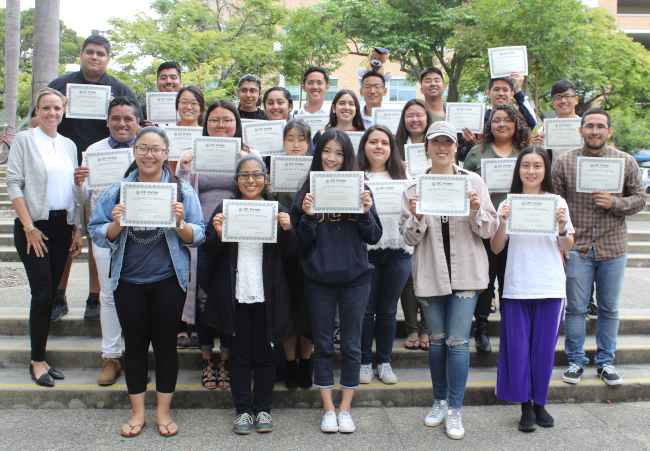|
Co-Director Jenel Lao and 2019 CASE Certificate Students This Spring marked the 8th graduating class for the Certificate in Afterschool and Summer Education program (CASE), which also leads to a Specialization in Afterschool and Summer Learning and Development for Education Science majors. The 24 students who completed all six courses bring the total of CASE graduates to 218 since it began in 2012.
The CASE program has grown to serve over 300 students each year in courses covering a range of topics related to understanding how to design and develop high-quality programs that provide students important and meaningful opportunities to develop, learn new skills, and build content knowledge. The School of Education offers several courses with content that students can choose to apply toward CASE including those in math, arts, tutoring, bilingual tutoring, program evaluation and educational technology. Several courses have been designed to specifically address teaching content in afterschool and summer learning programs in the areas of science, reading enrichment, and coaching and fitness. To earn a certificate, students must complete, in addition to six required courses, a minimum of 70 fieldwork hours in an approved afterschool program. Students can complete the fieldwork requirement by finishing the foundations course, which requires 20 hours in a local pre-approved program, and then completing the final capstone course, which requires another 50 hours. Former Co-Director Professor Sandra Simpkins, who assumed the Director position in June, commented on the unique strengths of the CASE program. “CASE gives students an unparalleled opportunity to learn about child development in their coursework and then apply what they have learned in out-of-school activities through their fieldwork. The coursework-fieldwork synergy helps strengthen learning of our undergraduate students and enriches the lives of the children they work with.” The CASE capstone course provides students an opportunity to identify promising practices using exemplar videos and a program assessment tool developed by Chancellor's Professor Deborah Lowe Vandell. Students also engage in a case study of the evolution of what is now a global network of afterschool programs in order to understand the theoretical foundations that were key to its success. The final project challenges students to work in teams to apply the theory and research-based practices they have learned about in their CASE courses to the real-world context of their fieldwork sites in order to meet an identified need. Students field test their impact proposals by getting feedback from the sites and critically reflect on this experience. CASE graduates go on to work in the field of afterschool, community-based youth-serving organizations and teaching. Representative Comments from Graduates about their Course and Fieldwork Experiences During the CASE program, I learned how important the extra time after school was for students. I feel like I never realize how much an hour or two could help a student. The CASE program has given me the tools I need to be an effective afterschool staff member, one that is able to recognize and address the needs of students and provide them with the proper support. I’m motivated to help kids more than ever, especially seeing first-hand how much support and help they really need. I know it will not be an easy road ahead, but I feel confident in my knowledge and will continue to try and make an impact in the lives of children. After receiving my CASE certificate, I feel much more prepared to go in the education field once I graduate from the university. Before, I was dead set on just working in schools during the regular working hours to teach classes for a certain grade level. Now, I am much more open to working in these types of (afterschool) programs to help children develop and get prepared for the next stage of their educational life. I can confidently say that with the knowledge I have gained from the CASE program, I can begin to make a greater difference in the lives of the students and the families we work with. Interested in learning more? Click here. Comments are closed.
|
Resources for:
|
|


